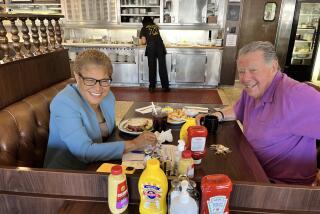In an economically depressed area of Long Beach, a fast-food franchise owner surrenders to harassment, while another fights for survival.
- Share via
Dean Usmani is having troubles with his neighbors.
According to him, they have angrily (and mistakingly) called him a Jew, an Italian and an Iranian. They’ve harassed some of his employees until they quit. They’ve fired bullets through his shop window, one of which missed him by two feet. And lately, he says, they’ve avoided patronizing the Louisiana Fried Chicken establishment he owns in Long Beach’s predominantly black area near Atlantic Avenue and Anaheim Street, forcing him to put the place up for sale.
“This is not the America I dreamed about,” said Usmani, 59, a dark-skinned native of India.
Vincent Williams, 31, runs another fried chicken outlet--the Golden Bird--in the same neighborhood. He too has had problems, mainly a preponderance of nighttime customers who are gang members. His business is off 50% in two years and he attributes that to adverse economic conditions.
“It’s a very economically depressed area,” said Williams, who is black.
But Williams is hanging on. By hiring people for his night shift who are young, black and female, he says, he has replaced potential violence with flirtation. And by sprucing up his place with the addition of such youthful diversions as a jukebox, he has managed to blend into the neighborhood.
The community’s perception of the competing establishments speaks loudly. It’s a neighborhood where disputes often turn on issues of race and turf.
“He’s robbing the black community,” said Shah Muhammad, 32, standing in front of Usmani’s place on a recent weekday afternoon. Describing himself as a Muslim, Muhammad said he avoids eating at Louisiana Fried Chicken in favor of Golden Bird because “over there (at Golden Bird) they got all blacks and jumpin’ music.”
“I feel that this should be a black-owned and black-run neighborhood,” Muhammad said. “I’m unemployed, but if I put an application in here he (Usmani) wouldn’t hire me because I’m black.”
Usmani denies that he discriminates in his hiring. His problems began in 1982, he says, only weeks after he took over the long-established chicken franchise. Usmani, a factory worker for most of his life, had lived for many years in England, where he married an English woman and raised five children. In 1973, the family moved to the United States and nine years later Usmani mortgaged his El Segundo home to buy a piece of the American dream.
With the chicken restaurant, Usmani inherited four black employees. Two weeks later, he says, one of them walked off the job without warning, prompting him to hire the first person who walked through the door looking for a job. She was white. And that, according to him, was the beginning of his woes.
Over the years, he says, he has employed six whites, several Asians and Latinos and about 40 blacks. Yet black customers faced with non-black employees have continually accused him of discrimination. At one point, he says, he even hired his 18-year-old son to replace a white employee who had been harassed so severely that she quit. But the verbal and physical abuse continued, he says, until the son also quit and joined the Army.
“It was terrible,” Usmani said. “He just couldn’t take it.”
Williams says he avoids such problems by employing mainly young blacks whose presence tends to defuse tensions. “If you have (Latinos) or whites it becomes a racial situation,” he says. “People’s gentle natures are taken as a sign that they can just be walked over.”
The presence of young black women at night, he says, tends to create an atmosphere in which violence is less likely to occur. “We try to reflect the community,” Williams says. “We tend to get more blacks here because of the area. If you don’t have the younger black set that can relate to the people, you could have a real security problem.”
Meanwhile, Louisiana Fried Chicken is down to two part-time workers, one black and one Asian. “I’m here all the time now,” said Usmani, who works 12 hours a day, seven days a week in a desperate attempt to keep the business going until he can sell it.
On a recent weekday afternoon, some of his customers were unaware of Usmani’s troubles in the neighborhood. “It’s news to me,” said Raymond Deas, 43, a merchant seaman based in the area.
Ray Borrego, 19, didn’t put much stock in the reports of alleged discrimination. “The worst thing he ever did to me was forget to give me a jalapeno,” he said, glancing at his chicken sandwich.
More to Read
Sign up for Essential California
The most important California stories and recommendations in your inbox every morning.
You may occasionally receive promotional content from the Los Angeles Times.










